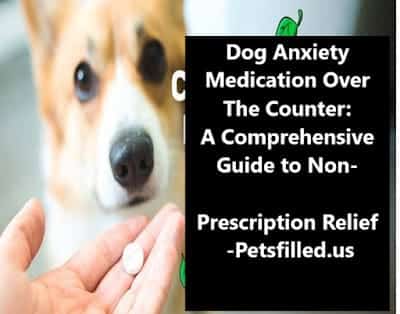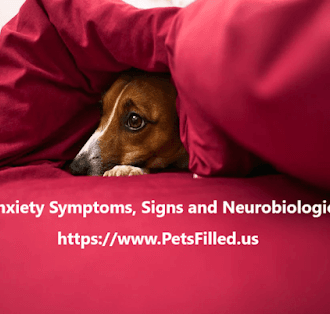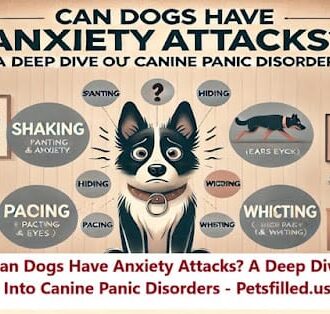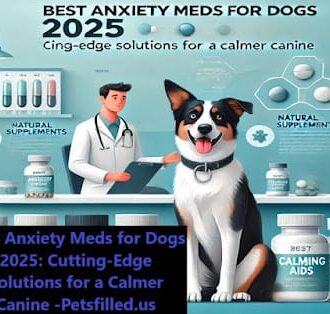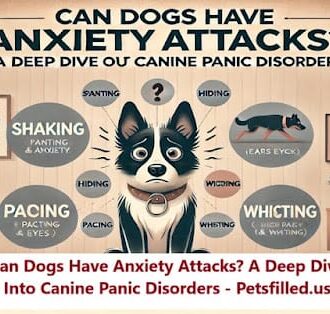Dog Anxiety Medication Over The Counter: A Comprehensive Guide to Non-Prescription Relief – Over-the-counter (OTC) dog anxiety medication offers pet owners accessible, non-prescription options to manage mild to moderate stress in their pets.
Unlike prescription drugs requiring veterinary approval, these remedies—ranging from CBD oils to calming chews—are available at pet stores, online retailers like PetsFilled, and pharmacies.
- CBD oils and treats – Natural hemp-derived compounds that may help reduce stress and promote calmness.
- Calming chews and supplements – Often containing ingredients like L-theanine, chamomile, or tryptophan, which support relaxation.
- Pheromone diffusers and sprays – Mimic natural calming signals that mother dogs release to comfort their puppies.
- Melatonin supplements – These can be effective for dogs with noise phobias or sleep disturbances.
They work by modulating neurotransmitters like serotonin or GABA, promoting relaxation without sedation. However, OTC options are not substitutes for professional care in severe cases.
For example, a dog with separation anxiety might benefit from pheromone diffusers, while noise phobia could improve with melatonin supplements.
Always consult your vet before starting any regimen, especially if your dog has health conditions or takes other medications.
Types of OTC Dog Anxiety Medications and Their Mechanisms
Contents
- 1 Types of OTC Dog Anxiety Medications and Their Mechanisms
- 2 Safety and Efficacy of OTC Anxiety Medications
- 3 Choosing the Right OTC Medication for Your Dog’s Needs
- 4 Limitations and When to Seek Prescription Alternatives
- 5 Integrating OTC Medications with Holistic Care Strategies
- 6 How Do OTC Anxiety Remedies Work?
- 7 When to Use Caution with OTC Solutions
- 8 Always Consult Your Veterinarian
- 9 Conclusion: Navigating OTC Solutions for Canine Anxiety
- 10 Dog Anxiety Medication Over The Counter (FAQs)
The OTC market for canine anxiety relief is diverse, with each category targeting specific biochemical pathways. CBD (cannabidiol) products, such as those in PetsFilled’s CBD Collection, interact with the endocannabinoid system to reduce cortisol levels and enhance mood.
Studies in Frontiers in Veterinary Science show CBD can decrease noise-induced anxiety by up to 83%. L-theanine, an amino acid found in green tea, boosts alpha brain waves to induce calmness without drowsiness—ideal for car rides or vet visits.
Valerian root and chamomile act as natural sedatives by binding to GABA receptors, similar to prescription benzodiazepines but with fewer side effects. Adaptil pheromone collars mimic a nursing mother’s calming secretions, reducing stress in 76% of dogs, according to AKC research.
Safety and Efficacy of OTC Anxiety Medications
While OTC dog anxiety medications are generally safe, quality and dosing vary significantly between brands. The FDA does not regulate pet supplements, making third-party testing crucial.
Look for products with Certificates of Analysis (COAs) verifying purity and potency—PetsFilled’s Lab Reports provide transparent documentation.
Avoid human medications like diphenhydramine (Benadryl) unless directed by a vet, as incorrect dosing can cause tachycardia or seizures.
Side effects of OTC remedies are typically mild: CBD may cause dry mouth, while melatonin could lead to temporary lethargy.
For dogs with liver or kidney issues, consult a veterinarian before using hemp-based products. A 2023 survey by the AVMA found that 68% of vets recommend OTC options as first-line treatments for mild anxiety.
Choosing the Right OTC Medication for Your Dog’s Needs
Selecting an OTC dog anxiety medication requires evaluating your pet’s triggers, age, and health status. For situational stress like thunderstorms, fast-acting solutions like CBD tinctures or Rescue Remedy drops are ideal.
Chronic anxiety may benefit from daily supplements containing L-tryptophan or S-adenosylmethionine (SAMe), which support serotonin production over time.
Senior dogs with cognitive decline often respond well to melatonin, which regulates sleep-wake cycles disrupted by canine dementia.
Use PetsFilled’s Anxiety Quiz to match your dog’s symptoms with the appropriate products. Combine OTC medications with behavioral training for optimal results—desensitization exercises paired with Adaptil diffusers can reduce a fireworks phobia by 40% within six weeks.
Limitations and When to Seek Prescription Alternatives
OTC dog anxiety medications have thresholds; severe cases involving aggression or self-harm require prescription interventions.
Drugs like fluoxetine (Prozac) or clomipramine (Clomicalm) are more effective for generalized anxiety disorder but necessitate veterinary oversight. According to the VCA Animal Hospitals, OTC options fail in 22% of dogs with trauma-related anxiety.
Red flags include persistent destructive behavior, refusal to eat, or panic attacks lasting over an hour. If your dog’s condition worsens despite OTC treatment, schedule a veterinary behaviorist consultation.
Prescription medications may be combined with OTC supplements under professional guidance—for example, trazodone for acute episodes plus daily CBD oil for baseline calmness.
Integrating OTC Medications with Holistic Care Strategies
Maximizing the efficacy of OTC dog anxiety medication involves synergistic lifestyle adjustments. Environmental enrichment—such as puzzle feeders from PetsFilled’s Enrichment Hub—reduces boredom-induced stress.
Aromatherapy with lavender or bergamot oils can enhance the calming effects of L-theanine supplements.
Acupressure mats stimulate pressure points to lower heart rate during car travel. Dietary modifications, like omega-3 fatty acid supplements, reduce inflammation linked to anxiety.
Regular exercise remains paramount: a 30-minute walk decreases cortisol by 58%, according to a 2017 study. Track progress using PetsFilled’s Digital Tracker to adjust dosages and routines.
How Do OTC Anxiety Remedies Work?
Most OTC anxiety solutions modulate neurotransmitters like serotonin and GABA, which play a key role in regulating mood and relaxation. By supporting these natural calming pathways, these products help reduce stress without making your dog drowsy or lethargic.
For example:
- If your dog struggles with separation anxiety, a pheromone diffuser or calming collar may provide a sense of security while you’re away.
- If loud noises like thunderstorms or fireworks trigger anxiety, melatonin supplements or calming treats can help ease their distress.
- If your dog experiences general nervousness, CBD oil or L-theanine-based chews may promote overall relaxation.
When to Use Caution with OTC Solutions
While OTC anxiety solutions can be helpful for many dogs, they are not a substitute for professional care in severe cases. If your dog experiences extreme panic, destructive behavior, aggression, or self-harm due to anxiety, prescription medication and behavioral therapy may be necessary.
Additionally, not all OTC products are created equal. Some brands use low-quality ingredients or ineffective dosages, so always choose vet-recommended, reputable products. Reading reviews and checking for third-party testing (especially for CBD products) ensures safety and effectiveness.
Always Consult Your Veterinarian
Before starting any new anxiety regimen, consult your veterinarian, especially if your dog:
- Has existing health conditions
- Takes other medications
- Is a puppy, senior, or pregnant dog
Your vet can recommend the best approach based on your dog’s specific needs, ensuring safe and effective anxiety management.
Over-the-counter dog anxiety medications provide accessible relief for stressed pets, but success hinges on informed, individualized use.
By understanding product mechanisms, prioritizing safety, and integrating behavioral strategies, owners can significantly enhance their dog’s quality of life.
Moreover, if your dog struggles with mild to moderate anxiety, OTC calming solutions can be a valuable tool in their care routine. By choosing high-quality products, understanding how they work, and consulting with your vet, you can help your furry companion feel more relaxed and comfortable in stressful situations.
For persistent or severe cases, always seek veterinary expertise. Explore PetsFilled’s OTC Handbook for curated product recommendations and dosage charts tailored to your dog’s unique needs.
